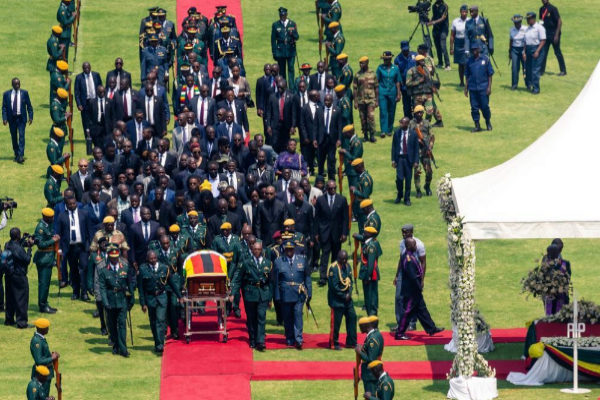Zimbabwe has paid last Saturday a national tribute to its controversial former president Robert Mugabe, "hero" proclaimed the independence of a country that ended up leaving extremely weakened after 37 years of authoritarian mandate .
Several African heads of state, active or retired, and tens of thousands of people began to fill the national sports stadium of Harare, the Zimbabwean capital, where funerals are expected with great pomp.
Among them are the South African presidents Cyril Ramaphosa , the Kenyan Uhuru Kenyatta and the Equatorial Guinean Theodore Obiang Nguema , who holds the record of the heads of states in exercise, with 40 years of mandate. Robert Mugabe died on September 6 with 95 years, in a luxury hospital in Singapore where he had been treated for years.
Forced to resign his position by a coup d'etat of the army and his party , Mugabe left a country shaken by repression and ruined by an endless economic crisis that plunged a large part of its population into misery.
"Despite some doubts about what some described as errors, the [...] government's position is very clear," the current Foreign Minister, Sibusiso Moyo, told AFP on the eve of the funeral. "The late president is an icon, " he said. "He did a lot of good, from the point of view of the government he is neither more nor less than a national hero," he added.
But this opinion is not always shared in the streets of Harare by the average Zimbabwean, whose life is marked by unemployment, three-figure inflation and a shortage of necessities. "Why mourn when we suffer like this?" asks Ozias Puti, 55, one of the many street vendors in the streets of the capital. Mugabe "It destroyed this country," he says.
Burial within a month
"Things were going much better with Mugabe," says Daydream Goba, a 27-year-old unemployed. "Commodity prices were lower. Now we don't have the money and the police are chasing us when we try to sell on the streets."
"I am here to mourn our hero," said a former combatant called "liberation war," Solomon Nyoka, 64. "Everything that is positive in Zimbabwe, its unity, its reconciliation, and the land that is already ours, is thanks to Mugabe."
Robert Mugabe not only divided his country in life, but also after his death, due to the question of burial. For several days, his family battled to be buried in his village in the district of Zvimba, a hundred kilometers from Harare. The government of his successor, Emmerson Mnangagwa, wanted instead to bury him in the "Field of Heroes", the local pantheon.
The dispute concluded on Friday, when it was decided to bury "Comrade Bob," as the leaders of his party dubbed him, at the Harare National Monument , but not before a month, to allow time to build a mausoleum .
"We will not bury him until the construction of that mausoleum is finished," Zimbabwean President Emmerson Mnangagwa said.
Since the fall of Robert Mugabe, the relations of the former president and his family with Mnangagwa, whom the former president publicly described as "traitor", are clearly bad.
In November 2017, the Army pushed Mugabe out, following his decision to expel Mnangagwa, then vice president, at the suggestion of his wife, Grace Mugabe. The then first lady increasingly coveted the succession of her nonagenary husband.
According to the criteria of The Trust Project
Know more- international
Zimbabwe - Death Robert Mugabe, former president of Zimbabwe at 95 years old
ComunidadAyuso disavowes Aguado for ordering the Community to disassociate itself from Avalmadrid
Politics The acting president of Madrid thanks public employees that the region remains "a benchmark of modernity"

